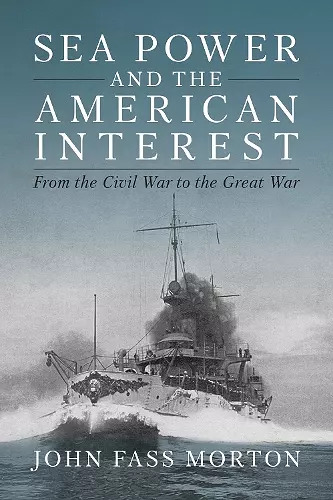Sea Power and the American Interest
From the Civil War to the Great War
Format:Hardback
Publisher:Naval Institute Press
Published:30th Apr '24
Should be back in stock very soon

From the Civil War to the Great War, the transatlantic commercial trading system that dated from the nation’s colonial times continued in America. By 1900, the sustainability of this Atlantic System was in the material interest of an industrial America on which its aggregate national prosperity depended. The principal beneficiary of this political-economic reality was the American moneyed interest centered in the Northeast, with New York City at the heart.
Author John Fass Morton explains how this country came to put a value on commercial opportunities overseas in support of America’s steel industry. Europeans and Americans alike pursued informal empires for resource acquisition and markets for surplus capital and output. Morton looks at how U.S. policy found consensus around the idea of empire, taking stock of the opening of Latin American and Chinese markets to American commerce as a means for averting socially destabilizing economic depressions.
Republican administrations reflected Wall Street finance and America’s other three Madisonian interests—commercial, manufacturing, and agrarian—with the Open Door and Dollar Diplomacy policies to establish fiscal protectorates in Central America and the Caribbean. Undergirding Dollar Diplomacy was their commitment to “a great navy” that would be the “insurance” for an ongoing American interest that Dollar Diplomacy represented. With the strategic arrival of the petroleum sinew and the Wall Street reassessment of the Open Door in China, the Wilson administration tilted toward protecting American investments in the hemisphere—notably in Mexico—with a “Big Navy.” With Wilson, a progressive foreign policy establishment arrived while continuing to reflect the transatlantic internationalism of the Northeast moneyed interest. As a twentieth century progressive institution, the Navy would thus sustain an American expansion that was now progressive.
The Navy story from the Civil War to the Great War reveals a truth. The foundational and dynamic sectors of a great nation’s economic base—its sinews—give rise to policy consensus networks that drive national interest, long-term strategy, and the characteristics of its elements of national power. It follows that the attributes of sea power must be material expressions of those sinews, allowing a navy better to serve as a sustainable and actionable tool for a great nation’s interest.
“For such a dense approach, the prose is fluid and easy to read. Where Morton excels is in linking infrastructure development to the emerging Atlantic System based on U.S. industrial output/export and eventual hegemony in finance.”—John T. Kuehn, Ph.D., Professor, U.S. Army Command and Staff College and author of Strategy in Crisis
“The introduction of steel for construction of bridges/skyscrapers and a steel navy is particularly interesting and provides an excellent grounding for understanding the emergence of America as a global power.”—Lawrence Burr, author of Battleship Iowa and Battleship Texas
ISBN: 9781682479117
Dimensions: unknown
Weight: 238g
392 pages